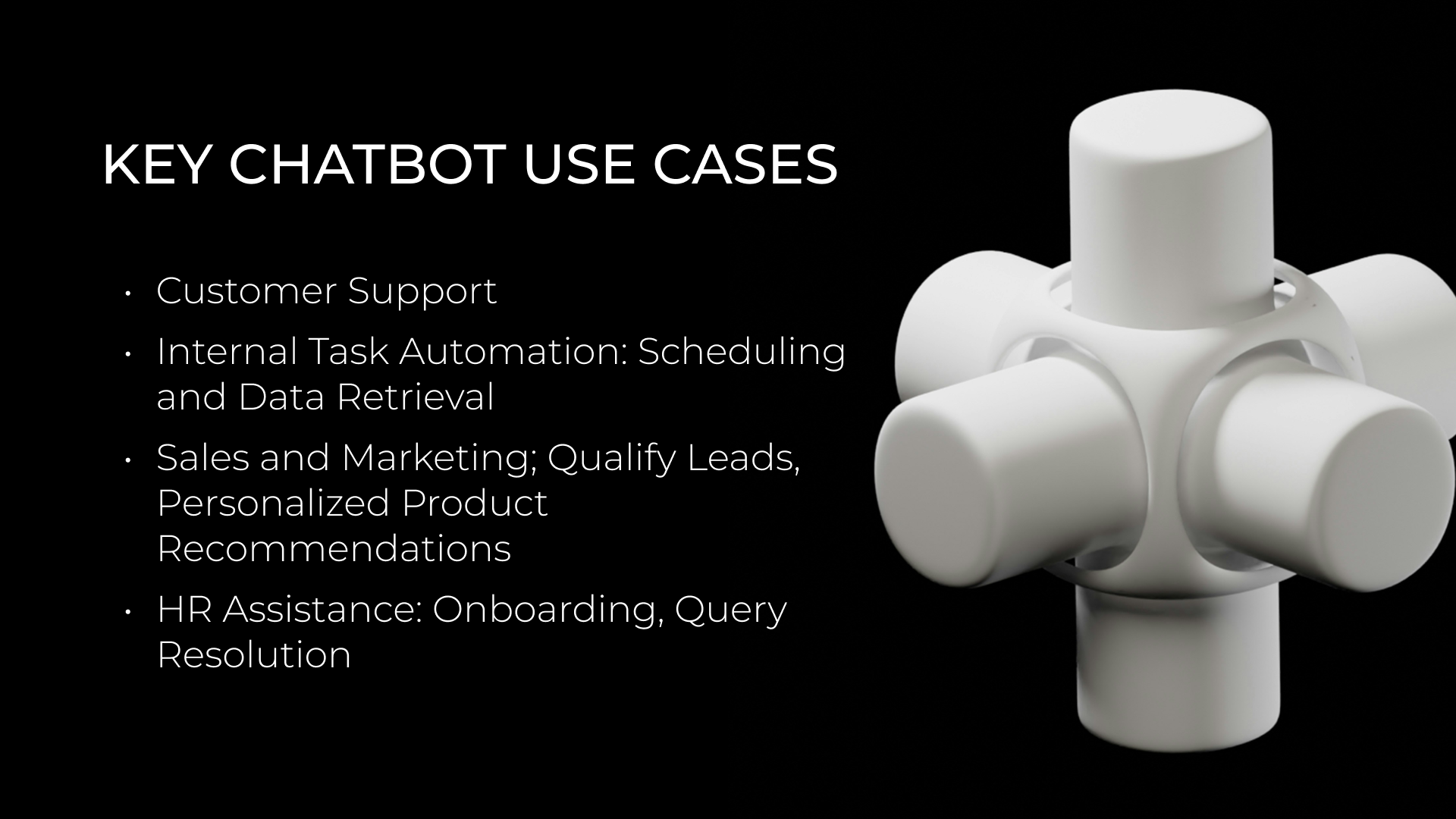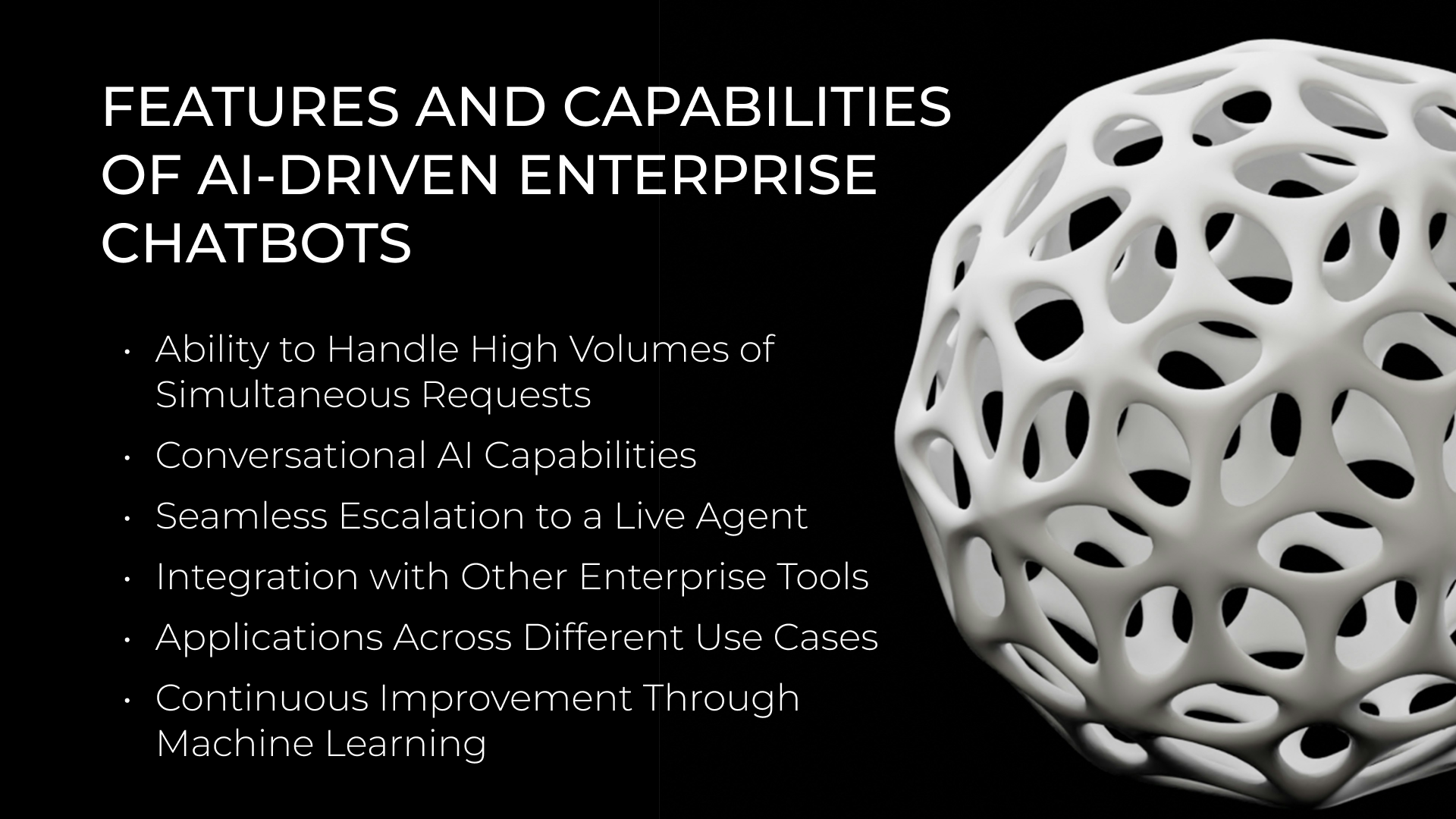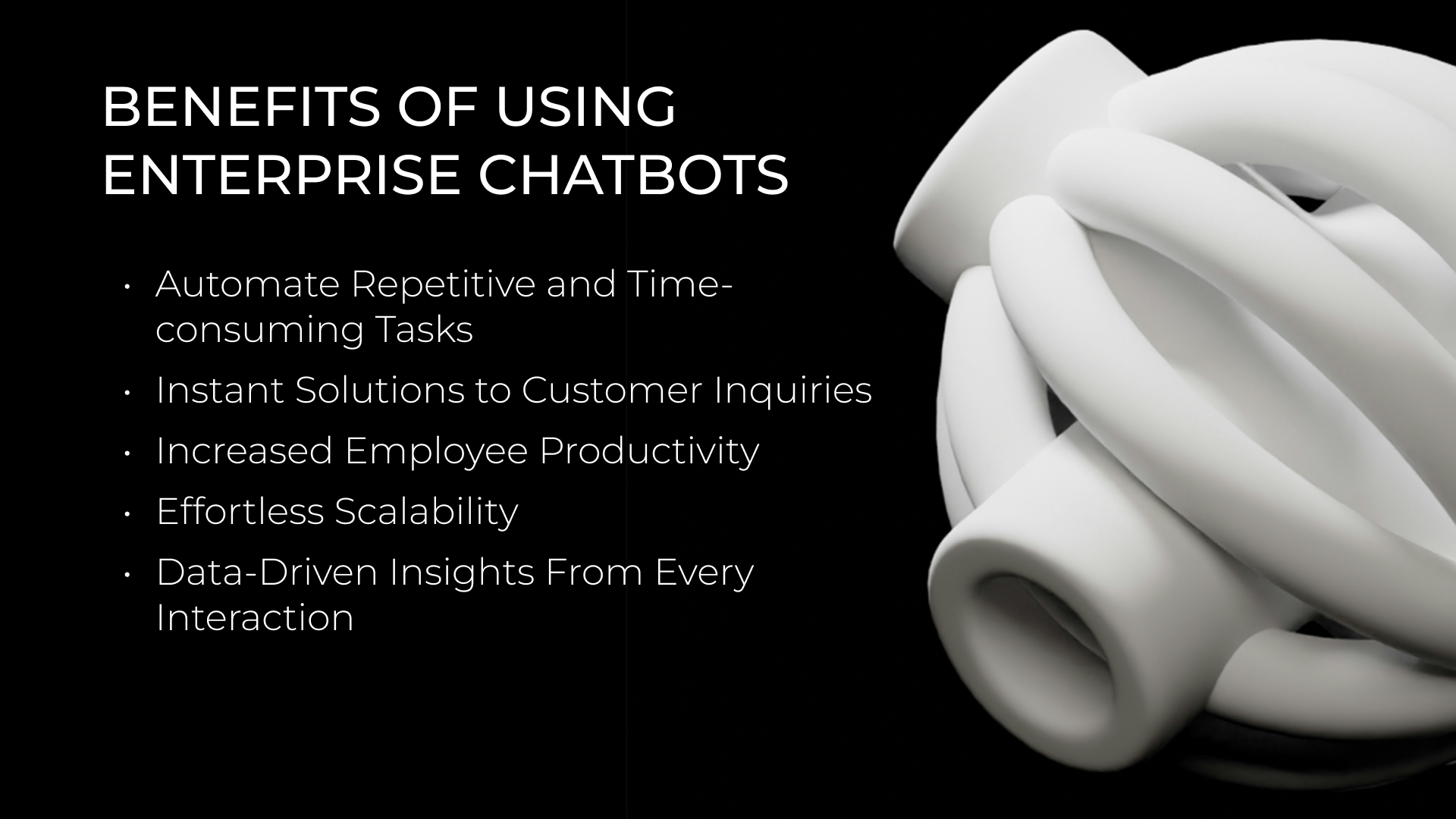AI-driven chatbots represent a transformative shift in how businesses engage with customers and optimize internal processes.
These intelligent systems use advanced technologies such as natural language processing (NLP) and machine learning (ML) to simulate human-like conversations, ensuring accuracy, consistency, and scalability.
Their primary purpose is to automate repetitive interactions, improve user experience, and enhance operational efficiency.
Looking for AI developers?
We create AI software — and we do it well. Talk to us to get your project started today
A chatbot's ability to understand and respond to user inquiries in natural language makes it an indispensable tool for enterprises.
Unlike traditional systems, which rely on rigid rules, AI-driven chatbots can adapt to diverse scenarios, learning from interactions to become increasingly effective. This adaptability positions them as vital assets in today’s dynamic business environment.
Some key use cases for enterprise chatbots include:
- Customer Support: Chatbots provide 24/7 availability, addressing common queries instantly and freeing human agents to focus on complex issues.
- Internal Task Automation: They take on administrative tasks such as scheduling and data retrieval, allowing employees to concentrate on strategic work.
- Sales and Marketing: Chatbots help qualify leads and offer personalized product recommendations, fostering deeper engagement.
- HR Assistance: These bots streamline employee interactions, simplifying onboarding and query resolution.

Core Technologies Behind AI-Powered Enterprise Chatbots
The effectiveness of AI-powered enterprise chatbots is underpinned by several core technologies that enable them to deliver intelligent, context-aware, and dynamic interactions:
Natural Language Processing (NLP)
NLP is at the heart of chatbot functionality, allowing the system to understand, interpret, and respond to human language.
By processing user inputs in real-time, NLP ensures that chatbots grasp the context and intent behind queries, providing accurate and meaningful responses. Advanced NLP models can also handle multi-turn conversations, making interactions more natural and fluid.
Machine Learning (ML)
ML empowers chatbots to learn from past interactions and continuously improve their performance.
Through supervised and unsupervised learning, chatbots refine their ability to predict user needs and adapt to new scenarios. This self-improvement process ensures the chatbot remains relevant and effective as user expectations evolve.
Integration with Enterprise Systems
A key aspect of enterprise chatbots is their ability to integrate with existing systems such as Customer Relationship Management (CRM) platforms and Enterprise Resource Planning (ERP) tools.
This integration enables chatbots to access real-time data, retrieve customer information, and perform actions such as updating records or processing transactions, thereby enhancing their utility and value to the business.
Features and Capabilities of AI-Driven Enterprise Chatbots
AI-driven enterprise chatbots have transformed how businesses operate by automating tasks, enhancing user experiences, and streamlining workflows. These advanced systems come equipped with a host of features and capabilities that make them indispensable tools for modern enterprises. Below, we delve into the key functionalities that set these chatbots apart.

1. Ability to Handle High Volumes of Simultaneous Requests
One of the standout features of AI-driven chatbots is their ability to manage thousands of interactions concurrently without compromising performance. Unlike human agents who can only handle a limited number of conversations at a time, chatbots operate on scalable cloud-based architectures that enable seamless multitasking. This makes them ideal for enterprises with large customer bases or those experiencing high volumes of inquiries during peak periods.
2. Conversational AI Capabilities
AI chatbots leverage advanced Natural Language Processing (NLP) and Machine Learning (ML) algorithms to deliver human-like interactions. They can understand context, recognize intent, and maintain multi-turn conversations, creating a more engaging and natural user experience. With capabilities such as sentiment analysis and adaptive learning, these chatbots can tailor their responses to meet the unique needs of each user.
3. Seamless Escalation to a Live Agent
While AI-driven chatbots are designed to handle a wide array of queries, they are also equipped with mechanisms to escalate issues to human agents when necessary. This ensures that complex problems or sensitive matters receive the attention they require. The transition is typically smooth, with chat history and user context passed on to the agent, enabling them to provide informed assistance without the need for users to repeat themselves.
4. Integration with Other Enterprise Tools
Modern enterprises rely on a variety of systems such as Customer Relationship Management (CRM) platforms, Enterprise Resource Planning (ERP) software, and other specialized tools. AI chatbots can seamlessly integrate with these systems, enabling real-time data access and streamlined workflows. For example, a chatbot integrated with a CRM can retrieve customer details instantly, update records, or process transactions, reducing manual effort and enhancing efficiency.
5. Applications Across Different Use Cases
AI-driven chatbots are highly versatile, with applications spanning various domains and industries. In customer support, they provide instant answers to FAQs, troubleshoot common issues, and guide users through complex processes. In HR, chatbots assist with onboarding, leave management, and employee training. They also play a crucial role in sales and marketing, where they engage prospects, qualify leads, and deliver personalized recommendations. Their adaptability ensures they remain valuable across a range of business functions.
6. Continuous Improvement Through Machine Learning
Unlike static systems, AI-driven chatbots continuously evolve through machine learning. By analyzing past interactions and user feedback, they refine their understanding and improve their performance over time. This self-learning capability ensures that chatbots remain relevant and effective, adapting to changes in user behavior, language trends, and business requirements. The more data they process, the smarter and more accurate they become.
How much will your project cost?
Order an initial consultation and get an accurate cost estimation and project roadmap
Benefits of Using Enterprise Chatbots
Enterprise chatbots are transforming the way businesses operate by providing scalable, intelligent, and efficient solutions to common challenges. These advanced tools offer a wide range of benefits, making them a crucial part of modern enterprise strategies. Below are the key advantages of using AI-driven enterprise chatbots:
- Operational Efficiency: One of the most significant benefits of enterprise chatbots is their ability to automate repetitive and time-consuming tasks. By handling tasks such as answering FAQs, scheduling appointments, or processing basic transactions, chatbots free up human employees to focus on more complex and value-driven activities. This automation not only saves time but also reduces operational costs, contributing to overall business efficiency.
- Enhanced Customer Experience: AI-driven chatbots ensure faster response times, providing instant solutions to customer inquiries. Additionally, their ability to deliver personalized interactions—tailored to individual user preferences and past behaviors—creates a more engaging experience. By being available 24/7, chatbots enhance customer satisfaction and loyalty, helping enterprises build stronger relationships with their clients.
- Employee Productivity: By taking over mundane and repetitive administrative tasks, chatbots allow employees to focus on strategic and creative work that drives business growth. Tasks such as managing internal queries, retrieving data, or assisting with onboarding can be efficiently handled by chatbots, leading to increased employee satisfaction and productivity.
- Scalability: Unlike human teams, AI chatbots can handle thousands of interactions simultaneously without experiencing fatigue or delays. This scalability is especially beneficial for enterprises dealing with high volumes of customer inquiries or seasonal spikes in demand. Whether it’s managing customer support, sales inquiries, or internal communications, chatbots can scale their operations effortlessly to meet business needs.
- Data-Driven Insights: Every interaction with a chatbot generates valuable data that can be analyzed to uncover trends and patterns in customer behavior. Enterprises can use this data to gain actionable insights, such as identifying common customer pain points, understanding preferences, or optimizing product offerings. These insights enable businesses to make informed decisions and continually improve their services.

Use Cases for Enterprise Chatbots
AI Businessware Technologies, we focus on creating AI solutions for business. Over the course of our work, we have seen how AI conversational chatbots have changed the way companies conduct their business operations. Below we have outlined two use cases of AI chatbots for enterprises based on real applications we’ve developed for our clients.
Take a look at our portfolio
AI Assistant For Sports Statistics And Bets Analysis
Our client approaches us to develop a smart assistant for sport bets analysis and predictions based on ChatGPT. The core functionality revolved around processing large amounts of historical data to provide accurate answers to users' questions.
We have created a flexible and reliable smart assistant capable of answering complex user questions about sports statistics, as well as perform predictive analytics and offer betting data.
- Complex Data Analytics: We have integrated OpenAI's GPT to process user requests and perform complex analytics: frequency questions, questions requiring calculations, like mean values and probability estimations. Our team has fine-tuned GPT to generate personalized responses, offer users accurate sports statistics, predictive analytics and betting information.
- Chabot UI: We have designed the smart assistant UI to resemble the most popular chatbots to make user interaction with the system intuitive. The system is open source to facilitate simple chatbot integration into our client’s systems and website, as well as provide flexible customization as the project evolves.
- Statistical Data Management: The application relies on sports data provided through reliable APIs from renowned sports data providers. Data providers often have a limit on the number of requests per minute, so it was not possible to establish operational interaction via the API. Given the restrictions, we have created a database which updates with new data as it becomes available.
- Data Preprocessing: Statistical data requires preliminary processing, like data cleanup and organization to prepare the data for the LLM to effectively process it. Data preprocessing ensures accurate data analysis and answers for users. In addition, we have trained GPT to generate SQL queries to obtain numerical data from the database.
AI Chatbot For Smart Database Search
Our client, a large company with hundreds of employees, multiple departments, and dozens of ongoing projects at any given time, approaches us with the task of Each department logs the progress on projects, approaches and work experience into a company-wide database — a collection of information on each completed and ongoing project.
The company approached us to develop a smart search system for the database which would help employees find information faster as well as restrict access to confidential or sensitive information based on the employee access level.
The chatbot-like search module lends itself perfectly to the use of natural language processing models. However, given the confidential nature of the information stored in the database, using models like ChatGPT is not an option due to data leaking concerns.
We have implemented a different approach to natural language processing.
- Data Security: The chatbot-like search module lends itself perfectly to the use of natural language processing models. However, given the confidential nature of the information stored in the database, using models like ChatGPT is not an option due to data leaking concerns. Taking the project requirements in mind, we have implemented multiple smaller language models which perform just as good in this particular application.
- Chatbot Interface: When a user asks a question, the system uses a retrieval language model which looks for parts of text which might contain the answer. After the texts have been located, a reranking model ranks them in order of relevance. The system can also combine text from multiple documents to provide a complete answer.
Future of Enterprise Chatbots
The future of enterprise chatbots is bright, with continuous advancements in AI technology driving their evolution. Here are some key trends shaping the next generation of chatbots:
Advancements in AI Capabilities
As AI technologies like Natural Language Processing (NLP) and Machine Learning (ML) continue to improve, chatbots will become even more accurate and adaptable. These advancements will enable chatbots to handle increasingly complex queries, understand nuanced language, and provide more sophisticated solutions.
Voice-Powered Interactions
Voice-based assistants are becoming a critical component of enterprise chatbots. By integrating voice capabilities, businesses can offer hands-free interactions, making the technology more accessible and convenient for users. This will be particularly valuable in industries such as healthcare, logistics, and field services.
Proactive Assistance
Predictive analytics will empower chatbots to anticipate user needs and offer proactive solutions. For instance, a chatbot might notify a customer of a potential issue before it arises or recommend actions based on historical data. This shift from reactive to proactive support will enhance user experiences and drive efficiency.
Hyper-Personalization
With access to richer data sources and advanced analytics, chatbots will deliver highly personalized interactions. By leveraging user history, preferences, and behavior, chatbots can offer tailored recommendations, messages, and solutions, creating deeper connections with users and improving engagement.
Why choose Businessware Technologies as your software development company?
- Businessware Technologies is a reliable AI development vendor: it has been recognised as one of the top software development companies by Clutch and Manifest, it is a Top Rated Plus agency Upwork, and has received local awards for its excellent work,
- A team of over 70 highly skilled software engineers with extensive experience in developing complex software for both startups and Fortune 500 companies,
- Deep expertise in modern AI technologies and approaches to system development, like data science, machine learning, OpenCV, Python, Tesseract, and many more,
- Businessware Technologies is a Microsoft Gold Certified partner,
- Businessware Technologies is compliant with GDPR, ISO 9001, ISO 27001 standards,
- Businessware Technologies works with Fortune 500 companies and has had decades-long relationships with most of its clients,
- Businessware Technologies has proven to be a reliable AI outsourcing partner by having an excellent track record in AI and ML development backed by an extensive portfolio of successful projects.
If you have a computer vision project in mind and need help with implementation, contact our manager and they will be happy to help you.